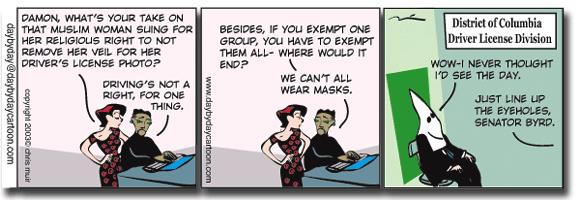The Florida Veil Case: An opinion here and another opinion here. And from day by day:

I don't know Florida's constitution but I do know that since Employment Div., Dept. of Human Resources of Oregon v. Smith,494 U.S. 872, 110 S.Ct. 1595 (1990), her case does not have legs under the federal constitution:
"[D]ecisions have consistently held that the right of free exercise does not relieve an individual of the obligation to comply with a "valid and neutral law of general applicability on the ground that the law proscribes (or prescribes) conduct that his religion prescribes (or proscribes)." United States v. Lee, 455 U.S. 252, 263, n. 3, 102 S.Ct. 1051, 1058, n. 3, 71 L.Ed.2d 127 (1982) (STEVENS, J., concurring in judgment); see Minersville School Dist. Bd. of Ed. v. Gobitis, supra, 310 U.S., at 595, 60 S.Ct., at 1013 (collecting cases). In Prince v. Massachusetts, 321 U.S. 158, 64 S.Ct. 438, 88 L.Ed. 645 (1944), we held that a mother could be prosecuted under the child labor laws for using her children to dispense literature in the streets, her religious motivation notwithstanding. We found no constitutional infirmity in "excluding [these children] from doing there what no other children may do." Id., at 171, 64 S.Ct., at 444. In Braunfeld v. Brown, 366 U.S. 599, 81 S.Ct. 1144, 6 L.Ed.2d 563 (1961) (plurality opinion), we upheld Sunday-closing laws against the claim that they burdened the religious practices of persons whose religions compelled them to refrain from work on other days. In Gillette v. United States, 401 U.S. 437, 461, 91 S.Ct. 828, 842, 28 L.Ed.2d 168 (1971), we sustained the military Selective Service System against the claim that it violated free exercise by conscripting persons who opposed a particular war on religious grounds.If you don't believe me then go look up City of Boerne v. Flores,
Our most recent decision involving a neutral, generally applicable regulatory law that compelled activity forbidden by an individual's religion was United States v. Lee, 455 U.S., at 258-261, 102 S.Ct., at 1055-1057. There, an Amish employer, on behalf of himself and his employees, sought exemption from collection and payment of Social Security taxes on the ground that the Amish faith prohibited participation in governmental support programs. We rejected the claim that an exemption was constitutionally required. There would be no way, we observed, to distinguish the Amish believer's objection to Social Security taxes from the religious objections that others might have to the collection or use of other taxes. "If, for example, a religious adherent believes war is a sin, and if a certain percentage of the federal budget can be identified as devoted to war-related activities, such individuals would have a similarly valid claim to be exempt from paying that percentage of the income tax. The tax system could not function if denominations were allowed to challenge the tax system because tax payments were spent in a manner that violates their religious belief." Id., at 260, 102 S.Ct., at 1056-57. Cf. Hernandez v. Commissioner, 490 U.S. 680, 109 S.Ct. 2136, 104 L.Ed.2d 766 (1989) (rejecting free exercise challenge to payment of income taxes alleged to make religious activities more difficult)."
521 U.S. 507, 117 S.Ct. 2157 (1997), wherein the federal supreme court struck down an attempt by the Congress to change this standard to one which would be more favorable to allowing a picture with the veil.
Look, the State of Florida has a valid nuetral reason for this law. Police need a way to make initial identification on the road. Is it perfect? No. But it is the least intrusive most practicable method available. The other options might include a nationwide database with everybody's fingerprint or retinal scan available to each and every officer on the street. However, on top of the frightening civil liberty aspects, this would require each State and the fedgov to do a massive (impracticable) investment in technology in each patrol vehicle. Of course, assuming the database, there is always the option of having everyone whom the officers pull over taken into custody and delivered down to the station to have him/her checked. Of course, then each and every 15 minute stop the officer makes on his shift turns into a hour long debacle and would probably turn street enforcement into a myth.
If anyone has a less intrusive, nuetral-purpose option I am open to hearing it.
.

No comments:
Post a Comment